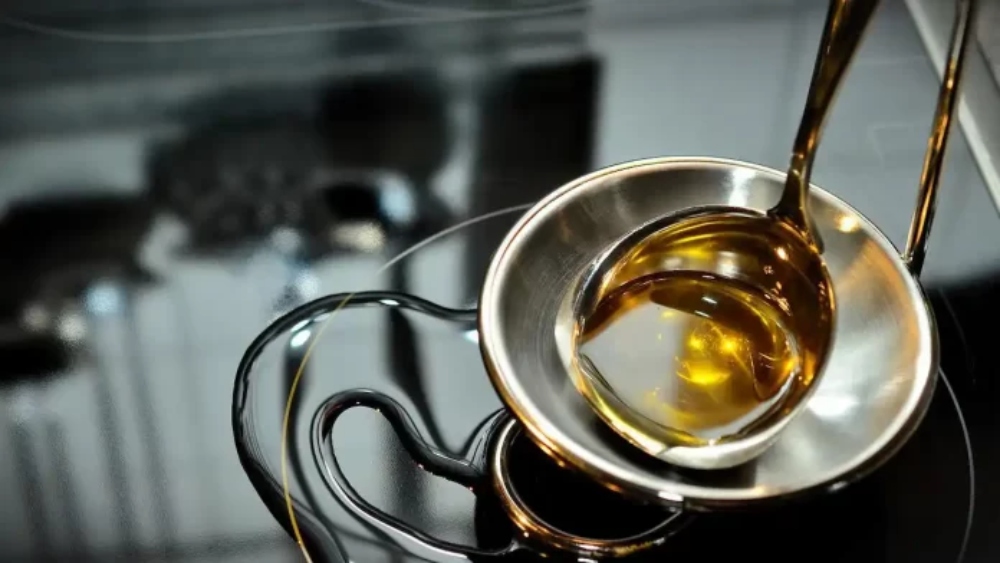Comments
- No comments found

Olive oil, butter and everything in between elicits the most mouthwatering reactions.
They are the foundation of so many favourite meals. With that kind of reputation, there is some weird and wonderful intrigue about how manufacturers and scientists make oils. Unravel the science of oil hydrogenation and the best facts to share with friends and family during every meal.
Oil hydrogenation is when you turn liquid oils, like vegetable oil, into a semisolid or complete solid, like margarine. The secret to this reaction is actually in the name of the process — all you need to do is add hydrogen to the liquid oil.
Food manufacturers do this to preserve food and give it a nice, smooth texture. The processing generally demands copious amounts of salt and sugar. Americans, specifically, are known for having high amounts of processed foods in their diet, leading to numerous health concerns, like diabetes, mental health problems, and obesity. However, not all hydrogenated oils are created equally, though makers form them similarly.
How does this reaction take place? First, you start with any unsaturated fat containing carbon atoms with double bonds, like olive oil. A catalyst, like nickel, is employed to hasten hydrogen gas distribution throughout the substance. As this happens, the double bonds transform into single bonds. It solidifies the liquid into a spreadable substance like butter.
There are two types of hydrogenated oils — partial and full. Using a term like “partial” makes it seem like the substance isn’t as fatty, but that’s isn’t what it’s referring to. Partially hydrogenated oils (PHOs) are a source of trans fats. Many people try to avoid them at all costs, though some naturally occur in meat and dairy products.
The FDA stated PHOs were not safe for consistent human consumption in 2015, promoting the discontinuation of adding them to foods. The determination was based on extensive research and public contributions. You’ll see trans fats, among others, clearly defined on nutrition labels to let buyers make more conscious choices. The transparency is a result of the feedback, hoping unnecessary adverse ingredients would not be included.
PHOs contribute to thousands of heart attacks yearly because of their impact on cholesterol. Therefore, taking these out of food creates a healthier planet. Though the FDA would prefer people consume fully hydrogenated oils (FHOs) if they consume fats at all, it doesn’t mean FHOs don’t impact your well-being.
The science of oil hydrogenation has been employed since the early 20th century. Butter is delicious and versatile, which, among other reasons, made it prohibitively expensive. People weren’t willing to give up their cooking oils, so they innovated. Both World Wars made butter hard to find, leading to wild price tags. Margarine was partly a response to the exorbitant costs, changing how people cook and eat forever.
If you have a dietary restriction limiting animal products, you shouldn’t have to worry about some hydrogenated oils. There are many out there to choose from without dairy. Plus, the scientific reaction contains no animal components, and many oil sources are plant-based. These include:
Palm oil is another option, but it remains one of the most controversial because of its negative environmental impact. Other plant-based alternatives like algae could become more popular in the coming years for even more renewable, nutritious options for all diets.
Oxidation is when electrons leave a substance, causing reactions like rusting on metal. Fats react to excess oxygen by creating free radicals, which are unstable, unpaired molecules. You don’t want your food to experience oxidation because those free radicals and other influences lead to spoilage.
Food manufacturers want to make food as strong as possible to keep customers healthy and costs low. They often employ hydrogenation machines to improve the oxidative stability of the fats they make. You can achieve this in multiple ways, such as incorporating more antioxidants and maintaining good storage practises. Thankfully, this science is also part of why fats maintain their wonderful flavour for so long.
The science behind the hydrogenation of oil demands a catalyst to control the reaction’s activation energy. Catalytic processes are why oil processors and manufacturers can get as much output as possible. Hydrogenation would likely not happen without a catalyst, depending on the temperature.
The most common catalysts are metals like platinum, palladium or nickel because of how quickly they attract hydrogen. The hydrogen absorbs to the metal’s surface, making oil hydrogenation possible in many more environments. Don’t worry — these don’t make it into your food. Without them helping the hydrogen bubble, the bonds wouldn’t dissolve as efficiently.
Can you make customised hydrogenated oil? Technically, you can do this with a process called selective hydrogenation. Scientists experiment with this all the time to change the fat’s qualities, like consistency, viscosity or melting point. They do this by only targeting precise double bonds instead of leaving the hydrogen to its own devices.
This could change the nutritional quality of countless hydrogenated fat-based products, including pasta, frosting, potato chips and more.
Hydrogenated oil creates a product with emulsive qualities. Why would you want your solid oils to be an emulsifier? It means you can mix oils together with ingredients that would otherwise be challenging to combine, such as water. Oils' emulsification potential is the reason behind many delicious foods, including most salad dressings.
The hydrogenation of oil doesn’t just taste good — it also makes for some fascinating scientific reactions. Plus, countless other industries like pharmaceuticals and cosmetics use them to make a medley of delightfully scented and slippery products, including lotions. The practical uses for oil hydrogenation extend far outside food, potentially fuelling the future for fossil fuel-free energy and industry — all because butter was too expensive.
Emily Newton is the Editor-in-Chief of Revolutionized. She is a science and technology journalist with over three years covering industry trends and research.
Leave your comments
Post comment as a guest